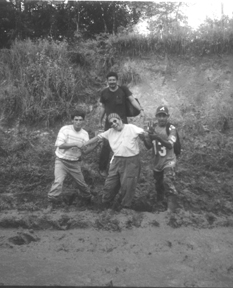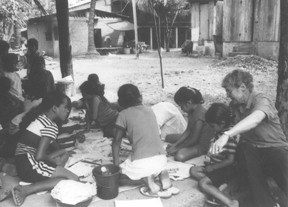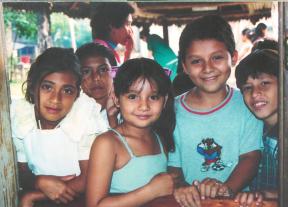In this Spring 2003 edition of ¡Abrazos!
de Mulukukú you will find,
A letter from Dorothy;
Women's Clinic Report 2002;
What Inspires Us;
Our Common Values;
A new book featuring Dorothy & the Clinic.

 |
| Due to heavy rains, the road to Rio Blanco
was impassable by vehicle for several months. Dorothy wades through the
Nicaraguan mud with a little help from her friends.
[–Photo by Martha Miller]
|
Thank you!  Thank you!
Thank you!  Thank you!
Thank you!
Congratulations to all our devoted supporters who dug deep and pulled
us through.
Dear Friends,
Warmest greetings from your co-workers: the women of the clinic and
cooperative and our male staff and supporters, in our joint efforts to
walk with the campesinas, campesinos and their children on this little
bit of earth which is Mulukukú, Nicaragua. You and we are
blessed each time our work saves the life of a child, when we accompany
a woman as she refuses to be a victim of violence any longer, when a little
girl is placed in a safe environment where her father or stepfather can’t
go to her bed in the night and violate her child’s body.
WOMEN’S CLINIC
REPORT 2002
PERSONS SERVED
Women
Children
Men
Dental
Wound care
TOTAL |
5,047
2,984
1,021
695
411
10,158 |
Principal reasons for women’s visits were for family planning,
pre-natal care, gynecologic infections and other reproductive system problems.
1,254 cervical Paps were done with required treatment. 1,307 women came
for family planning, the majority (65.4%) choosing the 3-month injection,
Depo-Provera. Respiratory infections, parasites and malaria were the main
reasons for children’s visits. A weekly dental clinic relieves pain, treats
dental infections, and fills cavities. Children under the age of 7 yrs
in 13 grade schools have their teeth painted with fluoride every six months
to retard caries. Men come with accidents and a variety of infections. |
Your rapid and generous response to our appeal
for help with the economic crises at the end of last year was more than
we could have hoped. All staff are back on full-time, the soy kitchens
are opening, we are again able to help all patients who do not have money
to travel for further care, and there is a good start on this year’s budget.
To receive a “thank you,” try to envision the eyes of a child as the light
of life returns, a woman, who for the first time, holds her head high when
saying “no more” to violence, the cautious smile of a little girl as the
fear begins to loosen its hold.
FUNDRAISING IN NICARAGUA
We have searched here for help among groups that
support projects in Nicaragua and have had the following excellent results:
Swiss Workers Aid (Ayuda Obrera Suiza), who has
supported the Cooperative since its beginning in 1989, continues support
for the Defense and Legal Aid Program for Women and Children and health
education.
Danida, of the Embassy of Denmark, will contribute
support of our administrator, various parts of the Defense and Legal Program,
a scholarship for a social worker, and a program for emotional recovery
from violence for children and women.
Central American Health Institute over the next
two years will provide the equivalent in services and materials of $25,000
for the detection and treatment of pre-cancer and cervical-uterine cancer
in 5,000 women ages 25 and older. American Jewish World Service (AJWS)
(through the efforts of Jill Winegardner at WEN and a site visit to Mulukukú
will provide this year’s salary for a nurse and physician, three health
promoters, a natural medicine/acupuncture promoter, support for the Emotional
Recovery Program, and support for transportation.
Through a friend in Manauga, an anonymous donor
will enable us to purchase a strong 4-wheel drive vehicle at a Peace Corps
auction as well as contributing $18,000 to the clinic’s general expenses.
MINISTRY OF HEALTH RECOGNITION
The Ministry of Health (MINSA) has formally awarded
our clinic legal recognition. We are now received cordially, invited
to meetings and offered full cooperation from all departments of MINSA.
NICARAGUA TODAY
Former President Arnoldo Alemán continues
under house arrest despite efforts of his attorneys.
Almost daily groups are on the streets of Managua
protesting the strangulating effects of IMF pressures on the society. Coffee
workers who require price protection, university students demanding their
legal share of the national budget (they won the battle), mayors of cities
and towns protesting lack of funds, and ex-Contras demanding that the broken
promises of three Nicaraguan administrations be fulfilled.
A demonstration of several hundred protested the
threatened U.S. war on Iraq and coincided with the massive protests in
the U.S and Britain.

IN THE NEWS
The 9-year-old daughter of Nicaraguan migrant farm
workers in Costa Rica was raped and became pregnant. To save the
life of their daughter, the parents requested and obtained a therapeutic
abortion, allowed under the Nicaraguan Constitution, to save the life of
a mother. The Roman Catholic Church leadership promptly ex-communicated
the girl’s parents and all who participated in and supported the
procedure. One of our patients, Zeneyda, who suffered a serious heart condition,
was too poor to buy her family planning injection when our clinic was ordered
closed. She became pregnant, was denied a therapeutic abortion, and died.
Physicians live in fear of the Roman Catholic Church, which has been pushing
to rescind the law. The doctors who performed the abortion to save
the life of this 9-year-old are heroic.
 |
| Joyce with art class.
[–Photo by Martha Miller]
|
Schools have opened but most children are not enrolled
because their parents cannot pay the fees demanded by the IMF/Government
agreements as education, health, social and other services are privatized.
Nicaragua Network Hotline Feb. 24 reports: “The
U.S. government is gradually insinuating itself back into the Nicaraguan
Army 24 years after the triumph of the revolution ended the reign of terror
of the U.S.-created and funded National Guard. Last year, for the
first time since 1979, the Nicaraguan Army began sending officers to train
at the Army School of the Americas in Ft. Benning, Georgia (‘School of
the Assassins’).”
The health of the poor deteriorates. There
are no new jobs to provide money and the daily struggle for a plate of
beans and tortillas is primary for most families. Improvements in
MINSA during the past several years have been in building, not in medicines
or supplies. The MINSA Health Post in Mulukuku often turns to us for sterile
gloves, bandages, sutures, IV tubing and always to transfer critically
ill patients. Epidemics such as dengue and malaria grow uncontrolled.
Many hospitals are filthy, placing both patients and staff at risk. Health
workers in the public system are discouraged and often surly or worse.
To consult a specialist in a public hospital requires a minimum waiting
period of six months.
U.N. REPORT
The U.N. Human Development Agency Report of 2002
states the following:
 Maternal Mortality as 150
deaths for 100,000 live births.
Maternal Mortality as 150
deaths for 100,000 live births.
 Infant Mortality as 37 deaths
for every 1,000 live births.
Infant Mortality as 37 deaths
for every 1,000 live births.
 Deaths of children from 1
to 5 years as 45 per 1,000 live births.
Deaths of children from 1
to 5 years as 45 per 1,000 live births.
These figures are far below the reality.
MINSA itself estimates that there is a 51.1% sub-registry in infant deaths.
The crisis created by the fall of coffee prices has provoked hunger and
the death of many children. Mental illness grows as survival becomes
more desperate. Suicides, alcoholism, depression and psychosis are
all on the rise.
STAFF
Health Promoter Natalí Montoya, practitioner of natural medicine
and acupuncture, is treating patients during the week and taking university
classes weekends in her last year of psychology. Nurse Gloria Montenegro
is finishing her last year (5th) of secondary school so she can study more
advanced nursing.
 |
| Paul Fry-Miller with young patient.
[–Photo by Martha Miller]
|
Managua House Manager Roxana Montoya graduated in Social
Work from the University of Central America and is now assisting with the
organization and training of communities in Mulukukú. On weekends
she is studying rural development in a master’s program.
MANCHESTER COLLEGE MEDICAL AND DENTAL DELEGATION’S 11TH YEAR
The nearly 40-member delegation of health practitioners, students and
support people did magnificent work in Mulukukú and Santa Rita in
their two-week annual visit. It was perhaps the happiest, most cohesive
group we’ve ever hosted. A total of 2,234 people were served: 926
women, 531 children, 240 men, 502 dental, 35 tested for hearing and receiving
hearing-aides, 1,697 wound care. 344 paps taken and 4 biopsy specimens.
26 patients are being sent for further care. Ed and Martha Miller
came out of retirement to lead the group. As always with our medical
delegations, the quality of health care was excellent.
AMERICAN JEWISH WORLD SERVICE
This organization, that is funding us beginning
this year, brought 12 Jewish Canadian university students for a week of
work and study. The young people worked extremely hard, 8 to 9 hours
a day in the blazing sun, preparing earth for a new medicinal plant garden.
They learned from the people of Mulukukú and shared their spirituality
with us. From their own people’s history of suffering, the group
instantly and deeply understood the suffering of the Nicaraguan people.
In sharing their Shabbat service, we were all nurtured.

Friends,
The news in this letter and in the world is sad and
heavy. World War III may be about to start. What can we do?
 Each day is a gift and
we must do the best we can with it.
Each day is a gift and
we must do the best we can with it.
 Don’t allow an opportunity
to pass when we can speak or act for justice. When there is justice, peace
will come.
Don’t allow an opportunity
to pass when we can speak or act for justice. When there is justice, peace
will come.
 Work with others to change
this brutal world economic system that sacrifices the poor for the benefit
of the few.
Work with others to change
this brutal world economic system that sacrifices the poor for the benefit
of the few.
 Share your resources
in supporting works such as ours which are alternative models as to how
human beings can care for one another.
Share your resources
in supporting works such as ours which are alternative models as to how
human beings can care for one another.
 Honor the earth and love
and protect all life.
Honor the earth and love
and protect all life.
 “Live simply that others
may simply live.” –Muriel Lester
“Live simply that others
may simply live.” –Muriel Lester
All strength to each of you in your work to make this a kinder, more
gentle world where all God’s creatures will live in peace and joy.
Abrazos,


 |
| Students from Nicaragua's School of Fine
Arts painting mural on clinic walls. Financial assistance for this
project was made through a enthusiastic anonymous donation.
[–Photo by Martha Miller]
|
What inspires us?
Why do so many of us keep
up with the story of Mulukukú? Why do we make donations, join
delegations, clip photos from the newsletter and display them in a prominent
place?
Margot Signer, a federal
government retiree who practices folk art and weaving, shares that
her involvement began on a delegation in the early 1990s. “I was probably
60 at the time,” she says, “And it’s not an easy place for an ‘old’
woman to be. We stayed with a family–a mother with three children–and I
learned first-hand how little they had. Their home was one of the concrete
block homes the women construct themselves, and my hostess made sure the
door was locked at night, even though it was so hot. They live with a sense
of danger, but the houses feel safe because they are bullet-proof.”
Margot’s trip was led by
David Belt of Kansas City, who told delegation members: “You're not going
to Mulukukú to help people, necessarily, you're going there for
you–to educate and inspire yourself.” Margot says that what she learned
about living conditions and the political situation has stayed with her
and inspires her to donate every year. “I know how much my donations can
do there; I trust that when I send my money, it will go directly to services
for the people I met.” She credits David Belt for his dedication over the
years, educating all sorts of American volunteers and also developing sustainable
personal bonds with the families of Mulukukú. “It’s not just a Christmas
and Easter basket deal,” she says.
One of her most vivid memories
involves providing amateur massage skills to Dorothy, who had injured her
neck and shoulder. Dorothy asked Margot to teach these hands-on nurturing
skills to the women volunteering in the shelter for abuse victims, and
she feels she made a permanent contribution. Also, when an interpreter
joined her for a conversation with her hostess, she was asked if Americans
actually throw away food. “That was the most embarrassing question I've
ever had to answer,” she relates, for in telling the truth she had to admit
that many Americans waste more in a day than her new Nicaraguan friends
have.
If you would like to share
your experiences in future newsletters, please contact Ellen Farmer
at our email address.
Janie, Jill
& Kaki, Women’s
Empowerment
Network
 |
| We're healthy because you're involved! |
Our Common Values
The board at the Women's Empowerment Network and many additional volunteers
in Santa Cruz send our heartfelt congratulations and thanks to all supporters.
We raised $118,117 in the campaign, which covers more than half of the
annual budget for the Maria Luisa Ortíz clinic. We hope to never
be in such desperate straits again, and with your continued support, financial
or otherwise, we can move toward long-time financial stability. This has
been an especially heartening year as we took the time to talk with many
of you on the phone. Your ideas have been fantastic! You may hear from
us again as we begin a "donor dialogue" project this spring.
Dorothy will make a short tour of Albuquerque and the midwest in late
April and early May, ending up in Chicago. In July she will make the keynote
address at the Doctors for Global Health conference in Berkeley, California.
It is hard for her to be away from Mulukukú for too long, but if
you would like to invite her to your community, we will pass the message
on to her. As you can imagine, it takes a great deal of money and planning
to mount a large tour, so we feel these short trips might actually make
more sense for Dorothy over the next few years.
We know many of you are organizing your own communities in opposition
to the war. All of us attend as many marches, rallies, planning meetings,
vigils, and spiritual gatherings as we can, believing our participation
is making a difference. During this time of heightened awareness, we are
proud of our allegiance to the women of Mulukukú, who are fearlessly
confronting callous disregard for human suffering in Nicaragua. Our work
with them proves that a small number of dedicated people can indeed improve
the circumstances of many. Thanks for your participation!
Once again, we remind you that the needs of the poor never cease in
the unbalanced world. If you choose to donate only once per year, we understand
and do not mean to pressure you to donate beyond your means. Everyone is
doing what they can, and we are deeply grateful. Below is our address and
taxpayer ID number for your convenience. Also, you may use the Paypal link
to donate online.
Another way you can help is to send us the addresses of people you know
who might like to receive the newsletter in the mail. Please write to us
at: wempowermentn@yahoo.com.
You can also alert your email-loving friends to check out the website.
Stay strong! Keep the faith. And PEACE,
The WEN board, Santa Cruz, California



Women’s Empowerment Network
309 Cedar Street, #547
Santa Cruz, CA 95060
Tax ID 77-0566997
OR you may now help us through the convenience of your credit or debit
card through our new, secure PayPal system. Just click on the button
below:

If This
Soil Could Stop Bleeding: Nicaragua During and After the Contra War
by Worth Weller
A new book that features several chapters about Dorothy Granada and
the Mulukukú Women’s Clinic has just been published by Dewitt Books.
The author, Worth Weller, and his publisher are donating $2 for each directly
ordered book to the Women’s Empowerment Network or other groups involved
with the clinic. Details can be found by going to this website: BOOK.
¡Abrazos! de MulukukúArchived:
Fall, 2002
Summer, 2002 |

 |

